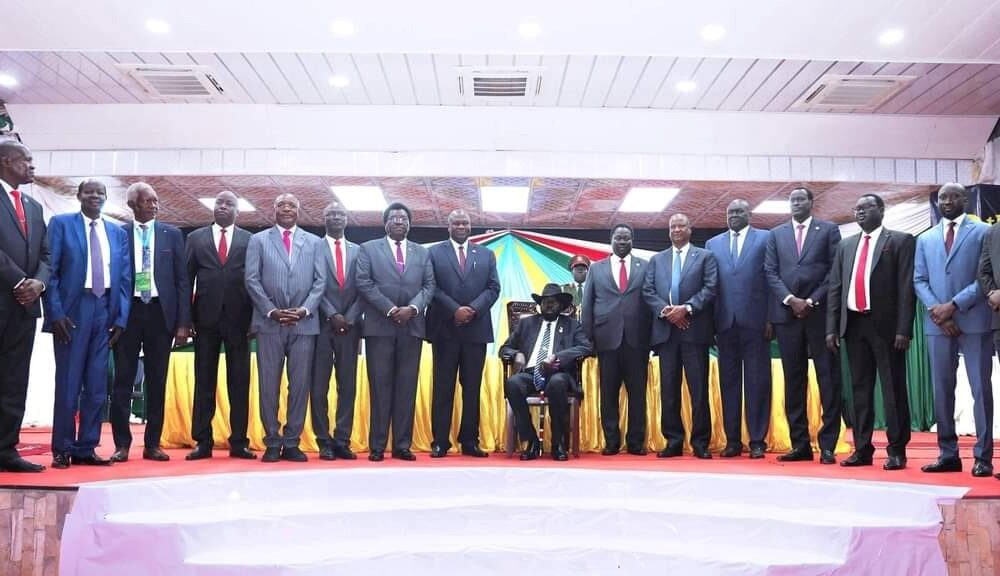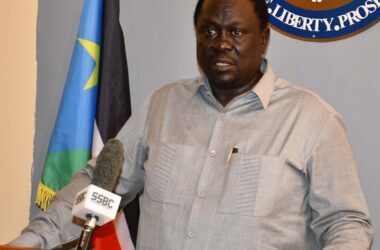By Yiep Joseph
The 8th Governors’ Forum concluded in Juba with the passage of 62 resolutions and 40 recommendations.
While the annual gathering of governors, chief administrators, and other stakeholders aims to address pressing issues facing South Sudan, concerns persist regarding the implementation of these resolutions.
A recurring theme at the forum was the urgent need to address the ongoing salary crisis. Civil servants have endured months without pay, and the 8th forum prioritized immediate salary disbursement as its top resolution.
However, with the country’s economic woes exacerbated by disrupted oil production, the government faces challenges in fulfilling this demand.
“Ministry of Finance and Planning to pay salary arrears and monthly salaries of public servants,” Leben Nelson, head of the secretariat, read out resolution number one.
Salary delays were a dominant topic at the forum, as many civil servants have gone almost a year without payment.
During the opening prayer, faith-based leaders urged officials to act on the forum’s agreements to improve the lives of citizens and guide the country toward stability.
Sheikh Abdallah Baraj, Secretary General of the South Sudan Islamic Council, reinforced this message, stating, “On behalf of religious leaders of South Sudan, I call for the implementation of the resolutions and recommendations of this conference (forum) because it is very important.”
Additionally, the forum addressed intergovernmental relations, resolving that the national government coordinate with state administrations to eliminate illegal checkpoints along national roads and waterways.
Other resolutions aimed at enhancing security and commerce included banning illegal tax collections in these areas.
The forum also resolved to halt child and women abduction, as well as cattle raiding and rustling in Jonglei, Greater Pibor Administrative Area, and Central and Eastern Equatoria.
While this resolution has been reiterated in previous forums, its successful implementation remains elusive. Establishing a mechanism for implementation could bring about necessary changes.
The relocation of cattle camps in Greater Equatoria, to their areas of origin as mandated by a 2017 presidential order, was also discussed, though the method for achieving this remains unclear.
In light of economic growth considerations, stakeholders called for an immediate cessation of illegal mining, which has been linked to human rights abuses and environmental degradation in areas like Central Equatoria and Pibor Administrative Area.
“Stop illegal mining for gold and other minerals and associated human rights abuses and environmental pollution problems in Central Equatoria State (Ganji and Wonduruba), Pibor Administrative Area, and other places,” the resolution partly read.
Other resolutions focused on improving agricultural practices, strengthening government workforces, and ensuring proper tax collection.
The forum also recommended forty actionable items, with the top priority being the need for the national government to allocate adequate funds to complete the training and deployment of unified forces.
This is essential for implementing Chapter II of the Transitional Security Arrangements Agreement, which includes comprehensive disarmament across the country.
Other recommendations included creating a conducive environment for investors and supporting farmers in crop production.
Civil Society Findings
A recent study by a civil society group revealed that only 3% of the decisions and proposals made at the 7th Governors’ Forum have been acted upon, underscoring the pressing need for change.
Civil society activist Edmund Yakani, executive director of the Community Empowerment for Progress Organization (CEPO), expressed concern over the lack of progress, particularly on resolutions aimed at preventing communal violence.
Yakani emphasized that while some governors showed promise in addressing communal violence, the majority have failed to deliver on the forum’s commitments.
“Only 3% of the previous state governors and chief administrators’ resolutions and recommendations were implemented, and with these recommendations and resolutions around the prevention of armed communal violence at states and administrative areas, we have seen good performance of some state governors and chief administrative areas in the prevention of deadly communal violence at states and administrative areas,” said Yakani.
He attributed the slow implementation to internal power struggles, as evidenced by the evaluation and observation of the CEPO’s forum watch initiated.
“Over 90% of our state governors are wasting their time in mitigating tensions of power struggle between governor and deputy governor, and this has affected some state cabinets even not to perform effectively,” he stated.
In addition to political infighting, Yakani criticized the mismanagement of state revenues, alleging that some governors and chief administrators are prioritizing personal gain over the public interest.
“Some state governors and chief administrators have paralyzed the state revenue authority’s performance in generating the state’s revenue in a transparent and accountable manner, simply because governors are milking state revenue, and some chief administrators are also milking administrative area revenue for their personal gain, not for the best interest of our citizens,” Yakani added.



